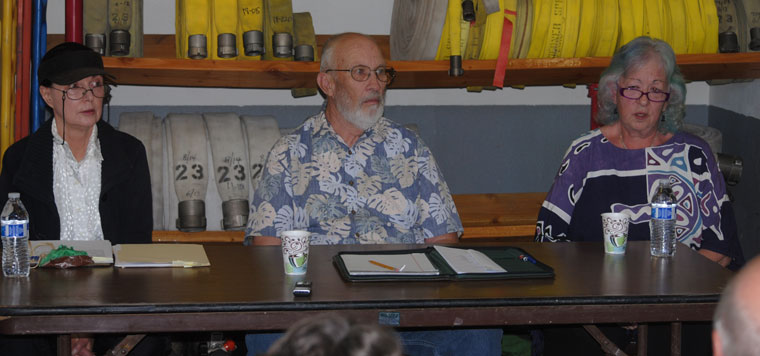Three candidates for two board seats bicker at PCWD forum

Photo by J.P. Crumrine
Tuesday evening, Aug. 4, about 25 Pine Cove residents came out to listen to the candidates for the Pine Cove Water District board answer questions from the public.
Besides an opening and closing statement, the three candidates — Diana Eskew, Sharon Kaffen and Tim Lange — responded to dozens of questions. The attendees wrote down their questions and forum moderator Vic Sirkin posed the questions to the appropriate candidate or to all three.
In her opening comments, Eskew, incumbent, stressed, “I like working for you and if don’t know the answer to a question, I’ll find the answer.”
Kaffen told the audience, “This election is critical and I’ve gone to other districts seeking advice.” In her closing statement, she averred that Stage 3 is imminent.
Lange emphasized his history of community service in Forest Falls and willingness to understand water problems and seek consensual solutions.
The first question, “What challenges still face the [PCWD],” was directed to Eskew. In response, Eskew stated, “The biggest is to keep educating our people on how to conserve water. Pine Cove is not in any trouble, we have plenty of water, but some [people] are not paying attention.”
All three candidates were asked their opinion regarding consolidation of the three Hill water districts — Fern Valley, Idyllwild and Pine Cove.
Eskew was the only one who stated directly, “I’m against it. Pine Cove voted against it.” She praised the district’s condition — no indebtedness, deep wells, no dry lake, great pipes and employees.
Lange acknowledged that local voters identify with their neighborhoods and were unlikely to want a larger water agency.
Kaffen replied, “I’ve not really studied or researched that issue. I have no opinion about that.”
When asked if the candidates thought PCWD’s financial position was sound and good, only Kaffen expressed concerns. “As far as we have been able to determine …” she began, then she mentioned a 15-percent increase in salaries at the same time as the board approved a 20-percent rate increase.
The salary growth was the total from 2012 through 2016, not annually. The rate increased was approved in April and applied to the rate for water usage for the next three fiscal years. Although the minimum monthly fee will advance each year, usage rates remain constant.
Both Eskew and Lange feel PCWD is in good shape going forward. Eskew said the district’s auditor told her, “[The books are] absolutely beautiful and they’re doing something right. The finances are in great shape.”
Earlier, Kaffen had also criticized the district for imposing the rate increase because it would penalize families more than singles and couples. Her reason was, “Children use a lot more water than retired couples.” She strongly asserted she stands against any more rate hikes, and to offset lowered revenues, she advocated reducing staff and contracting for the district’s pipeline and other work.
One issue addressed often during the session was the adequacy of the district’s water supplies. While Kaffen questioned the need for PCWD to move to a Stage 2 Water Emergency, she felt reliance on annual snowfall was insufficient for adequate future water. She recommended that the district implement efforts to collect rainfall.
She advocated constructing culvert and ditches, zigzagging on property, to slow the run-off in order to allow more rainfall to percolate into the ground. Eskew and Lange questioned the legality of impeding runoff since PCWD has no rights to any Hill stream flow. It relies solely on its wells.
But Kaffen stressed she had discussed this issue with the State Water Resources Control Board, who was fine with PCWD altering the rain runoff. Both Eskew and Lange recommended seeking a legal opinion about this proposal.
“We could be breaking the law diverting water flows. We cannot stop water flowing down the mountain. People further down have water rights,” said Eskew.
Kaffen was asked why she says water demand in PCWD is increasing while the customers are conserving. In response, she said that “a lot of new people are moving into the community and there’s an upsurge in water usage.” PCWD production has increased in 2013 and 2014, although it decreased every year since 2006 until 2013. Last year’s usage was 6 percent higher than 2012 while 15 percent less than the 2006 production level.
All three candidates had suggestions for further conservation measures. Eskew reminded people of the availability of free woodchips at the district office. Placed around plants, they retain water. Kaffen urged for a community car wash and finding a method to capture the water before it drained away. Lange encouraged more educational efforts and fire abatement. “Take out the small trees so bigger trees can drink more and fight off the bark beetle,” he said. He also warned against the encroaching non-native invasive plants, which are much more susceptible to fire.
When asked about PCWD’s infrastructure, Kaffen opined that relying on snow melt is antiquated. The district should do more for aquifer recharge “… or we will have dry wells.”
Lange strongly objected to the characterization that PCWD’s pipes and wells were antiquated, calling the statement “hogwash.” Since being appointed in July to fill Mike Esnard’s seat until December, he said he has reviewed reports and documents for the past two and three years and finds no indication of antiquated capital assets.
Eskew replied that during her time on the board (since 2012) the district has constantly been installing new pipes, meters and hydrants. “Antiquated? We have no pipes more than 50 years old. I have no worries, as Los Angeles residents do, that we’ll see geysers above our water pipes.”
When asked if PCWD’s customers were satisfied, Eskew responded, “Yes, I have received no complaint. If anyone in the district has come to me about something, it was complimentary.”
But Kaffen said she has spoken to “hundreds and hundreds of residents in Pine cove, and I have found a lot of dissatisfaction.” Lange replied simply, “Only my fellow candidate.”
Other subjects discussed included holding board meetings on the weekend, the district’s transparency awards, contributions of individuals to the board, whether the candidates had used the district rebates for water conservation improvements, EPA’s role in storm runoff, and the role of the jointly owned property in Dutch Flats to replenish wells.




